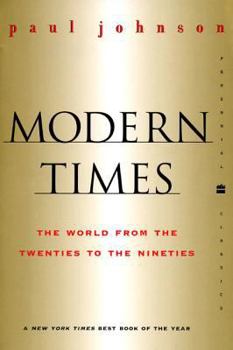Modern Times Revised Edition: World from the Twenties to the Nineties, the
Select Format
Select Condition 
Book Overview
The modern world began on May 29, 1919.
In this provocative and sweeping chronicle of 20th century history, acclaimed historian Paul Johnson argues that the confirmation of Einstein's theory of relativity set in motion a chain of events that replaced moral absolutes with a destructive new era of moral relativism.
This powerful work of intellectual history traces how the ideas of Marx, Freud, and Einstein were tragically twisted into justifications for the terrifying rise of totalitarianism. Johnson uncovers the horrifying consequences of social engineering, from Lenin's and Stalin's brutal experiments to the collectivist ideologies that swept the globe.
Spanning the decades from the 1920s to the 1990s, Modern Times Revised Edition is a monumental work of modern history that challenges our understanding of a century shaped by gangster-statesmen and secular ideologies.
This monumental work of political and intellectual history offers a stunning re-evaluation of our era, revealing:
A Relativistic World: How the confirmation of Einstein's theories in 1919 shattered old certainties and accidentally unleashed an age of moral relativism that shaped the century.The First Despotic Utopias: A stunning analysis of Lenin, Mussolini, and the rise of the first "gangster-statesmen" who sought to build heaven on earth through the hell of the police state.Legitimacy in Decadence: An examination of the fragile democracies of the 1920s and '30s, and how their internal weaknesses--and the emergence of Hitler--paved the way for catastrophe.Experimenting with Half Mankind: The disastrous consequences of large-scale social engineering, from Stalin's collectivization to the collectivist ideologies that swept the post-colonial world.The Recovery of Freedom: A sweeping account of the post-war world, the failures of the collectivist seventies, and the resurgence of individual liberty in the final decades of the 20th century.





